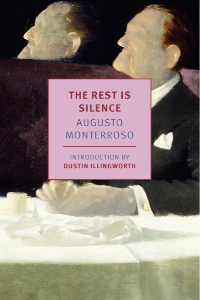The Rest is Silence — standing the test of time

Unlock the Editor’s Digest for free
Roula Khalaf, Editor of the FT, selects her favourite stories in this weekly newsletter.
The first signs of trickery in Augusto Monterroso’s The Rest is Silence are an epigraph — wrongly attributed — and an epitaph — for a man not yet dead. These wonderfully misguided opening tributes are in honour of Eduardo Torres, a fictional Central American writer whose life and work are put forward for celebration as he approaches the twilight of his career.
Monterroso was a very real Honduran-Guatemalan short-story writer, his 1978 novel here skilfully translated into English for the first time by Aaron Kerner. Torres was the product of his imagination, a chance to poke fun at the literary establishment and speculate on the legacy afforded to a provincial writer with an output unlikely to stand the test of time.
Comprising writing both by Torres and by those in his orbit, The Rest is Silence gradually paints an amusing portrait of a man utterly defined by his relationship to literature. We learn that his first word, at the age of five, was “book” — which sounds like it was lifted from the worst kind of university application letter. So too does his claim that translation is, “of all tasks essayed by the inquisitive human mind, if not the most difficult, then certainly the least easy”.
Tributes from friends and family are portraits of their attention-craving writers as much as Torres himself, and are marked by inadvertently comic turns of phrase and overwrought admissions. His valet spends most of his account fawning over the neighbours’ maid. His wife ends up ranting about what she’ll have to do with his vast library after he dies. His brother, a struggling journalist, manages to say exceedingly little with quite a lot of words. Things such as: “There were five siblings in our family, almost all of them young ladies, apart from myself and my brother.”

Alongside these recollections are excerpts from Torres’s own works: some tenuous criticism, an alphabetical array of aphorisms, an essay on Don Quixote so brief and dubious as to bolster a first-year undergraduate’s confidence. Cervantes is, he writes, a “renowned, indeed classic, peninsular author”, presumably attempting to pad an invisible word count.
Monterroso depicts all this with delight, devising such a larger than life character that Torres by no means feels an anachronism in 2024. The questions of fame and self-promotion that plague him resonate all the more in the age of social media and attention-hungry influencers. He is far more interested in being seen to be engaged in literary criticism than actually doing it. So he gives talks, hosts writers and collects books, all to mask the inadequacy of his actual ideas. In the end, The Rest is Silence is the sum total of his contributions: fragments, most of them fallible, and a handful of hangers-on, most of whom don’t seem terribly invested in his work.
Or so it seems until Torres himself wades into the final chapter, chiding the editors of the book for misrepresenting his own work and dismissing the tributes of his friends and family as “lightly falsified or indiscreet”. Whether he is genuinely a bad critic or just a victim of literary libel is left up to the reader to judge.
Of course, The Rest is Silence is a portrait of two writers, not one: the fictional Torres, who clearly agreed to the volume, despite all its flaws, in the hope of avoiding being forgotten; and Monterroso himself, who wrote the book while in his fifties perhaps in a similar frame of mind. But unlike Hamlet, who uttered the words of the title in his dying breath, Monterroso went on to live for another three decades, publishing mainly short stories. And for all Torres’s complaints about translation, it is this delightful new volume that will ensure both men’s legacy lives on.
The Rest Is Silence by Augusto Monterroso, translated by Aaron Kerner NYRB £15.99/$16.95, 176 pages
Join our online book group on Facebook at FT Books Café and subscribe to our podcast Life and Art wherever you listen
#Rest #Silence #standing #test #time






